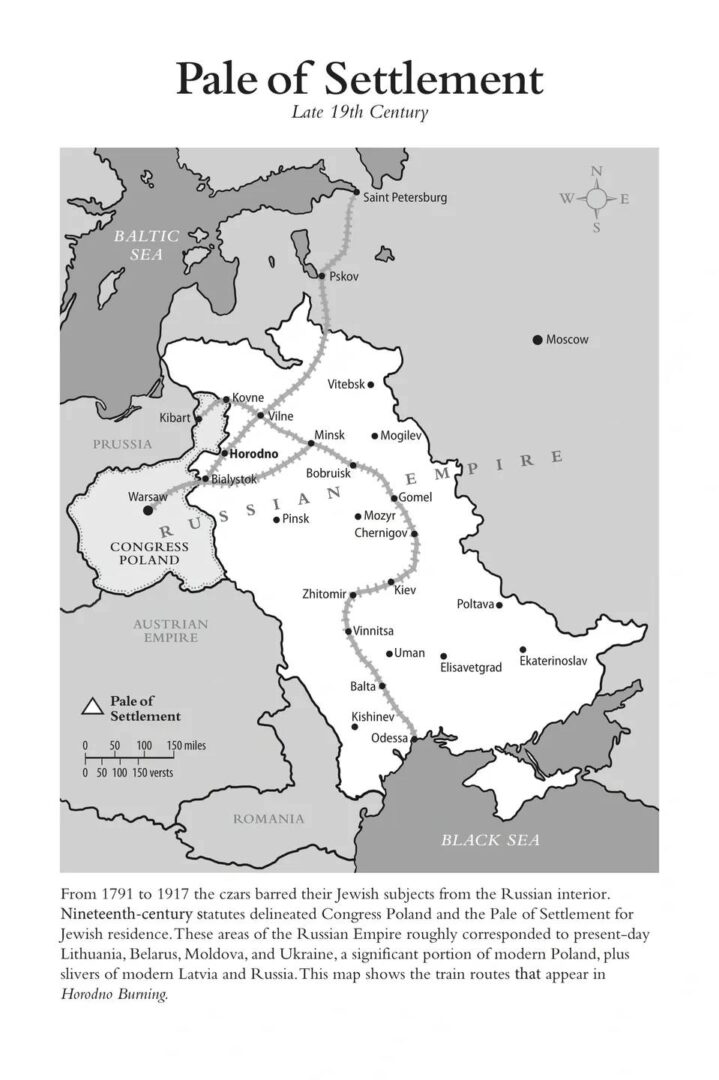Horodno Burning
A Turbulent History
Esther (Estes) Leving, a brilliant young bibliophile, chafes at male dominance, religious dogma, and antisemitism. Bernard Garfinkle, a religious Jew and the son of a vodka distiller, hides a shameful secret: in a culture that worships books, he can't read. Despite their differences, they fall in love. Estes teaches Bernard to read, and he, in turn, builds her a bookshop. They start a family, but when ferocious pogroms target Russian Jews, they must confront violent oppression.
Exploring this turbulent history, Horodno Burning brings the reader into a culture under terrible stress. How Estes and Bernard respond will determine not only who they become but whether they survive.
You can order a copy here:
Reviews
*Kirkus Reviews, September 10, 2021: A mesmerizing tale of love in a time of extraordinary trials.
*Historical Novel Society, Issue 101 (August 2022): Horodno Burning review by B. J. Sedlock
*Laura Stevenson’s One Minute Reviews of Books by Vermont Authors: Books and Brutality in Czarist Russia
*https://www.newpages.com/blog/books/book-reviews/horodno-burning/
Podcasts
*https://writethebook.podbean.com/e/michael-freed-thall-102521/
Story Comic Podcast, October 1, 2021: Storycomic Presents (Episode 110): Michael Freed Thall, Vermont Author
Publicity and Book Talks
Burlington Free Press, November 25, 2021: Consider these Vermont-related books, just in time for holiday-shopping season
The Montpelier Bridge, August 10, 2021: Michael Freed-Thall’s ‘Horodno Burning’
https://frontporchforum.com/calendar/events/268137
https://vermontjournal.com/news/a-talk-with-the-author-of-horodno-burning/

Map by Tim Newcomb based upon Hundert, The YIVO Encyclopedia of Jews in Eastern Europe (2008) © Yale University Press.
Horodno Burning is a work of historical fiction. To create a vivid backdrop to the story, I threw myself into researching relevant nineteenth-century topics such as the political boundaries, land features, climate, and history of the region. I also immersed myself in nineteenth-century novels, poetry, and the lives of authors and other historical figures who influence my fictional protagonists. Numerous personalities from the time appear in both significant and cameo roles.
Eliza Orzeszkowa, the first woman nominated for the Nobel Prize in literature, mentors Estes. Gesia Gelfman, who will later conspire with five others to assassinate Czar Alexander 11, is Estes's midwife. William Steinitz, a world chess champion, plays against Bernard and forty-nine other contestants in a simultaneous exhibition.
Finally, I investigated the Yiddish language and first-hand accounts of Jewish practices—how the rabbis saw secular learning as a deadly challenge to centuries of tradition.
In Horodno Burning, Estes, my iconoclastic heroine, also challenges religious dogma and limited opportunities for women. Through her, we experience the power of a transcendent literary imagination.